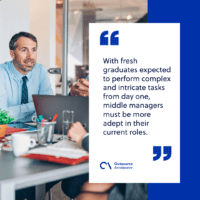AI takes over
Members of Generation Z about to enter the workforce might not have job opportunities available to them amid artificial intelligence’s (AI) rapid advancement.
LinkedIn’s chief economic opportunity officer Aneesh Raman warns that simple and routine assignments — tasks that historically served as stepping stones for young professionals — are increasingly being automated by AI. Data from the Federal Reserve Bank of New York show that the unemployment rate for college graduates has risen 30%, outpacing the 18% rise for the broader workforce.
This is a significant development for the global economy and businesses worldwide. Young professionals today are corporate leaders tomorrow. With AI taking over what was once their responsibility, how will their careers turn out?
Raman suggests overhauling educational systems by embedding courses with AI, so they know how to leverage AI to boost productivity. Businesses must also redesign entry-level jobs so that young workers are assigned high-value tasks instead of routine ones.
Middle managers
With fresh graduates expected to perform complex and intricate tasks from day one, middle managers must be more adept in their current roles. The middle manager — seen as the link between executives and staff — is tasked with developing talent, monitoring performance, supporting employee growth, and fostering collaboration.
They provide regular feedback on their performance by acknowledging accomplishments and identifying areas of improvement. Managers also lead by example, and therefore must exude excellence in decision-making, time management, and communication, among others.
However, these leaders are under threat amid a trend to flatten hierarchies to save costs. Logistics services UPS, e-commerce giant Amazon, and life science company Bayer are just some of the top corporations that have reduced their management layers. Experts claim that this could lead to critical skill gaps with serious implications for the future.
Necessary skills
This development feels like a step backward more than anything else. New entrants to the workforce will likely understand and leverage AI more effectively than older professionals. In a few years, they might be more technically-versed than their bosses.
In a world where every worker is technically proficient, those who have a solid foundation of soft skills will stand out. Professionals who know how to work effectively within a team, communicate clearly across all levels, and perform under pressure will thrive amid all workplace shifts and challenges.
These imperative skills can only be acquired from and developed by humans, particularly managers with years of experience working with diverse teams, mentoring staff, and navigating multiple crises. Instead of treating middle managers as expendables and scapegoats, corporations must now view them as specialists who possess the necessary skills for developing the future workforce, and therefore, the world economy.
The question for your business
How is the relationship between your middle managers and fresh graduates?




 Independent
Independent





















